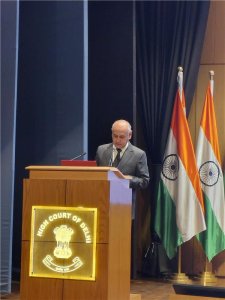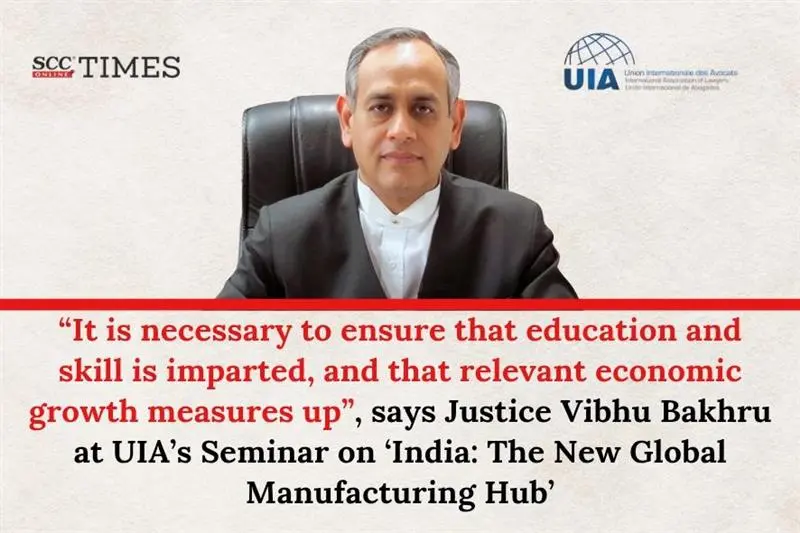The Union Internationale des Avocats (‘UIA’) has organized a two- day seminar on the theme ‘India Ahead: Exploring legal, regulatory and geopolitical updates impacting FDI in the world’s fastest growing economy’. The seminar held at the Delhi International Arbitration Centre (‘DIAC’), Delhi High Court, on 29th and 30th March 2025.
The welcome and opening ceremony of the event was graced by several distinguished luminaries from the legal field. Among the Guests of Honour was Justice Vibhu Bakhru, Judge of the High Court of Delhi, who delivered an insightful and thought-provoking speech.

In his address, Justice Bakhru emphasized the importance of the theme chosen for the seminar, highlighting its relevance in today’s rapidly evolving global economic landscape. His speech was not only a reflection on India’s growing prominence as a potential manufacturing powerhouse but also a reminder of the legal and regulatory frameworks that will play a pivotal role in shaping this transformation. His address set the tone for the discussions and deliberations that followed, inspiring all attendees to think critically about India’s role in the global manufacturing ecosystem.
Justice Bakhru reflected on India’s economic transformation, recalling that over three and a half decades ago, India was primarily an agrarian economy, with around 76% of the population engaged in agriculture and allied sectors. At that time, nearly 40% of the agricultural workforce was considered to be disguised as unemployed, meaning their removal from the workforce would not have substantially impacted productivity. He compared this scenario to the present, where India’s manufacturing and services sectors had grown significantly. The services sector, in particular, now contributed almost half of India’s GDP.
He further mentioned the demographic dynamics, with India’s population of 1.44 billion people, 65% of whom were under the age of 35. He pointed out that the country’s working-age population was growing, and to meet their aspirations and improve their standard of living, it was essential to focus on education, skill development, and fostering a conducive economic environment. Ensuring that India remained an attractive destination for FDI was crucial in this context.
Justice Bakhru discussed the role of FDI in driving economic growth, job creation, and the transfer of advanced technologies. He acknowledged the renewed focus on infrastructure development and green business, which had contributed to increasing FDI inflows into India.
Touching on the legal and regulatory landscape, Justice Bakhru highlighted several developments on both the legislative and executive fronts aimed at strengthening India’s position as an FDI destination. He noted that India had entered into double taxation avoidance agreements with 94 countries, with the Mutual Agreement Procedures (‘MAP’) now becoming a more widely used tool for resolving taxation issues. He also praised India’s progress in addressing challenges related to transfer pricing and advanced pricing agreements, which had helped streamline the tax process.
Justice Bakhru highlighted the legislative measures aimed at improving the ease of doing business in India, such as the Commercial Courts Act, 2015 and the Insolvency and Bankruptcy Code, 2016. He explained that these reforms had simplified the dispute resolution process by introducing strict timelines and clearer procedures. Additionally, the amendments to the Arbitration and Conciliation Act, 1996 had been designed to ensure the effectiveness of arbitration as an alternative dispute resolution mechanism, emphasizing the importance of impartial arbitrators and reducing court intervention in international commercial arbitrations.
Justice Bakhru also addressed recent Supreme Court judgments, particularly those concerning the independence of arbitrators and the fairness of the arbitration process.
In conclusion, Justice Bakhru underscored that while India’s legal frameworks were evolving, the successful implementation of these laws, supported by judicial oversight, would be crucial to sustaining India’s growth and attracting global investments. He expressed his confidence that the seminar would provide valuable insights into these issues and contribute to the ongoing discourse on India’s economic future.






